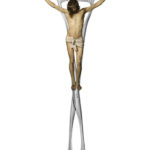The Holy Week is so marvelously full of nuggets of truth and surprises… Too bad most people are too busy to attend the celebrations.
Holy Saturday
At the Easter Vigil in the Holy Night of Easter (Year A)

I’ve never actually liked the Holy Saturday mass. Don’t get me wrong, far be it from me to pretend to define how a liturgical calendar should unfold, and this time I really mean it. But… Let me voice a feeling I bet others, ignorant as me, share. I remember the time when, as a teenager, I was already within the ranks of mass readers. The choices for the Easter Vigil readings took me by surprise.
Now, let’s ignore the fact that on this Saturday evening, which -after all- would still be a penitential day, awaiting the resurrection, we already rush to the opportunity to celebrate Easter: the Church itself seems somehow to be in a hurry to get to the finish line.
But we’re presented with a list of readings that feels like a summary rundown of the Old Testament, meant also as an introduction to the new faith for catechumens (newly baptized adults, a rare sight as of late).
We’re facing this novel, extraordinary event: an outcast, who died on a cross, is revealed as the Lord of life and death; and he manifests himself in his glorious body, after resurrecting. This announcement is in a way drowned in a flood of words: the ceremony itself, to a child, feels interminable.
My old parish priest always told us that this evening Vigil was the true celebration of Easter. He insisted we participated in this mass specifically.
On this fateful Saturday we’re listening to different stories, made somewhat unpalatable by the ancient Hebrews’ taste for emphatic repetition and their cavalier attitude towards finding glory through the shedding of blood, considering victory in war as a sign of divine blessing.
I recall the embarrassment with which I, perhaps a sixteen-year-old reader, proffered to the parishioners
The LORD is a warrior,
LORD is his name!
Pharaoh’s chariots and army he hurled into the sea;
the elite of his officers were submerged in the Red Sea.
thinking: “But… but I came for Easter, actually”…
That’s just one example: we literally start from Adam and Eve, then proceed through this Bible author’s dwelling on macabre concepts like that of the Egyptians lying dead on the seashore. For those parishes who choose to follow the entire program of readings, including the optional ones, they reach a grand total of 9 readings, of which 7 from the Old Testament and one from the Gospel. People lose focus.
For those who always go to mass, or at least do it during Holy Week, and above all from the subjective point of view of the priests, the resulting picture is really beautiful and complete: on Palm Sunday and on Friday you get the Passion account, twice is appropriate due to its centrality. On Thursday the Last Supper is covered, and those themes also deserve their space. The Gospel of the Resurrection appears twice, on the evening Vigil and on Easter morning; but during the former you can appreciate a whole preparatory story unraveling before your eyes, rich in prophecy and symbolic parallels.
But for the disengaged pew-sitter, everything that matters happens on Palm Sunday: you obtain a blessed gadget, there’s a short procession, plus you’re listening to the deep and touching story of the Passion…
Then we jump directly to Easter: either to Holy Saturday, which appears tiresome, and attention is lost in a series of themes and stories that seem to push modern men to feel disconnected from this religious world, so distant in tone and sensitivity. Or to Sunday, when however, in many parishes (due to the emphasis on Saturday as the “true Easter celebration”) there’s a reduction in attendance, the celebration seems subdued and casual worshipers may meet uncommitted Catholics like them…
That’s why we shouldn’t feel surprised by the words of that parishioner, becoming almost proverbial in my small world, who once boasted of her proud belonging to the Catholic Church by saying: “Oh, I care about this eh: I never miss Midnight Mass (at Christmas) and Palms Sunday mass!”
People who attend two masses a year instinctively “see Easter” in the Palm Sunday celebration.
That said, let’s not exceed in our criticism: keep the liturgy as it is.
Realistically we could never devise a distraction-proof liturgy. And having to face more challenging parts is still necessary. Without that laundry list of readings, Easter would be presented incompletely.
Perhaps it would only be necessary to clarify one point: the proper liturgical celebration of Easter should be on Sunday. Those who can’t attend have a nice alternative in the Saturday Vigil. For those who have the opportunity, parish priests should insist: try to participate in the 4 celebrations, from Thursday to Sunday, because this way you can savor Easter in its fullness; or at least, try to participate in those that you can.
There is a great richness to be explored, in the way in which the coming of the Savior, the announced Messiah, intertwines with the story of a people; is prefigured, prophesied, symbolized by Abraham who’s ready to sacrifice Isaac, by Moses who leads the people of God towards liberation from slavery, and finally represents the polar opposite (and God’s response) to the fall of Adam.
The fact that these anticipatory events sound so distant and alien to us is a function of a precise necessity, which should also be appreciated: a true prophecy must be fulfilled, yes, but in a different way than expected, otherwise one might think that there was nothing special in the prophecy itself. Complicated matter: I’ll have to revisit this concept.
Perhaps the true reason for a perceived embarrassment arises from the Old Testament register, for the aforementioned triumphalism, showing no qualms about glorying in a history full of bloodletting and wars sanctioned directly by God.
But here’s where we should learn and evolve: in questioning our revulsion for those events we find both a warning not to remain comfortably detached in our sanitized bubble of cowardly pacifism, and an opportunity to understand that God acts through the entirety of history, including the darkest corners. And, again, the distance we perceive between the meek Jesus who turns the other cheek and his proud, belligerent people is crucial to prevent the demystifiers from being right: if the story of this Messiah had been fabricated, they’d have come out with a different plot, perhaps casting him as a political or military leader.
This one Jesus we’d die to meet, the one we wait every year to celebrate as risen, is not the type of Messiah they expected, because that’s exactly how it should be: He’s beyond all our expectations.
Authentic also in not giving in: extending his hand but messing up our plans; guiding us to our true good, instead of granting our wishes.










































